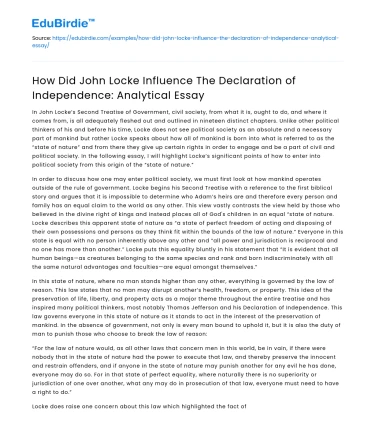In John Locke’s Second Treatise of Government, civil society, from what it is, ought to do, and where it comes from, is all adequately fleshed out and outlined in nineteen distinct chapters. Unlike other political thinkers of his and before his time, Locke does not see political society as an absolute and a necessary part of mankind but rather Locke speaks about how all of mankind is born into what is referred to as the “state of nature” and from there they give up certain rights in order to engage and be a part of civil and political society. In the following essay, I will highlight Locke’s significant points of how to enter into political society from this origin of the “state of nature.”
In order to discuss how one may enter political society, we must first look at how mankind operates outside of the rule of government. Locke begins his Second Treatise with a reference to the first biblical story and argues that it is impossible to determine who Adam’s heirs are and therefore every person and family has an equal claim to the world as any other. This view vastly contrasts the view held by those who believed in the divine right of kings and instead places all of God's children in an equal “state of nature. Locke describes this apparent state of nature as “a state of perfect freedom of acting and disposing of their own possessions and persons as they think fit within the bounds of the law of nature.” Everyone in this state is equal with no person inherently above any other and “all power and jurisdiction is reciprocal and no one has more than another.” Locke puts this equality bluntly in his statement that “It is evident that all human beings—as creatures belonging to the same species and rank and born indiscriminately with all the same natural advantages and faculties—are equal amongst themselves.”
Save your time!
We can take care of your essay
- Proper editing and formatting
- Free revision, title page, and bibliography
- Flexible prices and money-back guarantee
In this state of nature, where no man stands higher than any other, everything is governed by the law of reason. This law states that no man may disrupt another’s health, freedom, or property. This idea of the preservation of life, liberty, and property acts as a major theme throughout the entire treatise and has inspired many political thinkers, most notably Thomas Jefferson and his Declaration of Independence. This law governs everyone in this state of nature as it stands to act in the interest of the preservation of mankind. In the absence of government, not only is every man bound to uphold it, but it is also the duty of man to punish those who choose to break the law of reason:
“For the law of nature would, as all other laws that concern men in this world, be in vain, if there were nobody that in the state of nature had the power to execute that law, and thereby preserve the innocent and restrain offenders, and if anyone in the state of nature may punish another for any evil he has done, everyone may do so. For in that state of perfect equality, where naturally there is no superiority or jurisdiction of one over another, what any may do in prosecution of that law, everyone must need to have a right to do.”
Locke does raise one concern about this law which highlighted the fact of the impartialness and ill nature of man leading to the execution of punishments that do not fit the crimes done. Despite saying that living under absolute monarchs is a worse situation for mankind, Locke does concede that proper civil government acts as a “remedy” for many of the problems associated with this state of nature but man must willingly consent to be a part of it.






 Stuck on your essay?
Stuck on your essay?

